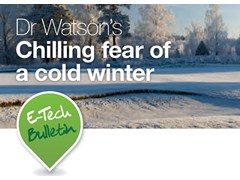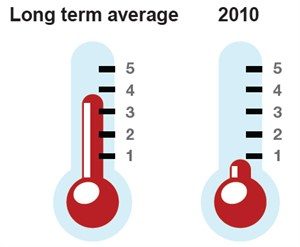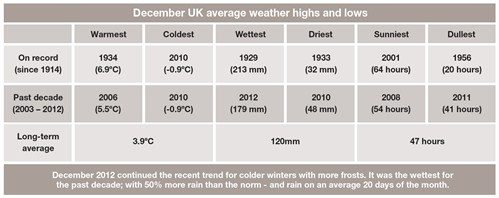
Although conditions have been unseasonably mild so far this December, long-term weather forecasters are predicting one of the coldest ever winters for the UK this year, with predictions of deep snow and prolonged frosts.
A number of weather pattern indicators suggest it will be worse than December 2010, when the UK experienced 23 days with an air frost, an average temperature of -0.9°C and an extreme average minimum of -4.1°C - over five degrees below the norm.

Winter 2010 was certainly extreme - with the heaviest and most extensive early snowfall for 45 years. But it was not unprecedented; with similar periods of snow cover recorded the previous year, from late December 2009 into January 2010.
And if you look at trends for the past five years, the December temperature has indeed been above the long-term average only once.

The prospect of prolonged snow cover and cold induced stress significantly increases the risk of Microdochium (Fusarium) Patch. Whilst air temperatures may be cold, the snow acts as a thermal blanket at soil level and creates permanently moist leaf conditions, where the disease pathogen can thrive.

Trials and on-course experiences in 2010 highlighted that when the snow thawed, turf without fungicide protection had been seriously hit. Turf managers who had applied Medallion TL ahead of forecast snow cover, however, reported excellent results - with turf remaining disease free.

Early reports this season indicate that, after the wet autumn, there is a high incidence of Microdochium inoculum present on the leaf and in the thatch in many turf surfaces. Applications of Medallion TL can reduce the pathogen loading, and help to deliver long-term protection for the turf leaf.
Winter 2013 disease threats |
|
|
|
|
Assessing this season's on-going risks, using the GreenCast five-day disease forecasts to proactively target application timing, can help to prevent disease affecting turf quality early in the winter, when there is little opportunity for recovery right through until the spring.

The Contact+ activity of Medallion TL not only works in the thatch and protects the leaf to prevent infection. However, new trials have also shown continued uptake of the active by turf plant roots provides exceptional long-lasting results in winter conditions.

Where there are periods of Microdochium Patch risk, use proactive applications of Medallion TL as close as possible to the infection period. Apply using Syngenta Turf Nozzles to target disease pathogens on the leaf, thatch and soil.
In variable weather conditions, or if applications have been delayed, the multi-active Instrata offers greater flexibility.
GreenCast weather and disease historic records have also proven a persuasive tool to help justify and explain their management regimes to greens committees and managers.
But the best testament comes from players with the greater satisfaction of better maintained turf conditions over the winter, and a cleaner start for the spring. Along with the greenkeepers who have seen the results for themselves:

| All the greens treated with Medallion TL came through the harsh winter period with no signs of disease and good retention of turf quality. We have been very happy with the results at Hanbury Manor. Stan Power, Golf and Estates Manager, Hanbury Manor |

| Greens treated with Medallion TL before any visible signs of Fusarium Patch stayed disease free right through difficult conditions, when we would normally have expected infection to break out. Despite the intense disease risk, the greens remained in the best condition for years. Ian Coote, Head Greenkeeper, Royston Golf Club |
Click here to download a pdf of Dr Watson's E-Tech Bulletin - Chilling fear of a cold winter
